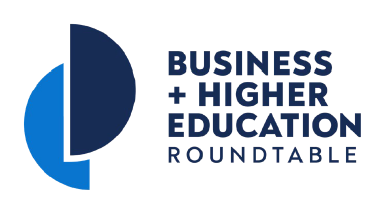
BHER and eCampusOntario Launch Report in
Support of Accessible Work-Integrated Learning
New report provides critical roadmap for postsecondary institutions to build
more inclusive digital environments for learners engaged in WIL
In celebration of National AccessAbility Week, Business + Higher Education Roundtable and eCampusOntario have released Accessible WIL: A Roadmap for Accessible Work-Integrated Learning, a new report outlining how institutions can provide more equitable and beneficial work-integrated learning experiences for all learners.
A key finding of the report is that institutions need to engage more meaningfully with digital transformation of the education and wrap-around services they provide to students with disabilities. Recommendations for institutions include displaying all WIL programming in basic accessible formatting, maintaining updated lists of technologies, equipment, and applications they can suggest to students and employers, and ensuring websites conform to WCAG 2.0 Level AA.
“Students with disabilities face multiple
barriers to accessing work-integrated
learning,” said Val Walker, CEO, BHER. “As
part of BHER’s vision to create a thriving
Canada where everyone has the
opportunity to reach their potential, we
support refining digital approaches that
streamline processes and ensure quicker,
more accessible WIL participation.”
According to the most recent data from the Canadian Survey on Disability (2022), around 8 million Canadians (or 27% of the population above age 15) have at least one disability. Moreover, there has been a rise in the disability rate among Canadian youth aged 15-to-24 years since 2017.
In terms of labour force participation, the employment rate among individuals with disabilities (25 to 64 years) increased slightly since 2017. However, the disparity in employment rates remains, with 62% of working-age adults with disabilities being employed compared to 78% of those without disabilities (Statistics Canada, 2023a). The report provides a valuable pathway for ensuring that WIL supports are accessible. This in turn will ensure better labour market participation rates for people with disabilities.
“Work-integrated learning opens pathways to meaningful employment by providing hands-on experience,” said Matthew McKean, Chief R&D Officer, BHER. “Institutions and employers must work together to tailor practices, policies, and staff competencies for the diverse needs of students with disabilities to make sure they are not left out of WIL.”
The new report also concludes that WIL students often refrained from disclosing disability and demonstrated limited self-advocacy, citing fears of stereotyping and discrimination. Employers have indicated that their resources to support students from diverse backgrounds are often either not well-developed or do not exist.
When considering postsecondary students with disabilities, a notable disparity exists in the participation of Ontarians with disabilities in postsecondary education compared to those without disabilities.
Alongside the report, eCampusOntario has launched a GPT to help users quickly find information they’re looking for within the
document.
To read the report, click here.
To access the GPT, click here.
“This roadmap provides a clear path for collaboration amongst accessibility services, career development teams, and employers to foster inclusive learning environments,” said Robert Luke, CEO, eCampusOntario. “By working together we can break down barriers, empower students with disabilities, and create equitable opportunities in education and employment. This is essential to ensuring our economy benefits from the perspectives of all.”
About BHER
Since 2015, The Business + Higher Education Roundtable (BHER) has connected, convened, and leveraged the power of its members to create opportunities for post-secondary students and workers, boost innovation, and drive collaboration. As a non-partisan, not-for-profit organization, BHER brings together Canada’s top companies and leading post-secondary institutions to tackle skills, talent, and economic challenges.
About eCampusOntario
eCampusOntario is a not-for-profit organization funded by the Ministry of Colleges and Universities, that supports innovation, collaboration and digital-by-design education in Ontario’s colleges, Indigenous Institutes, and universities. We provide the sector with platforms, programs and services to advance digital participation in postsecondary education, connecting Ontario’s postsecondary institutions and learners to the future of learning and the future of work.

